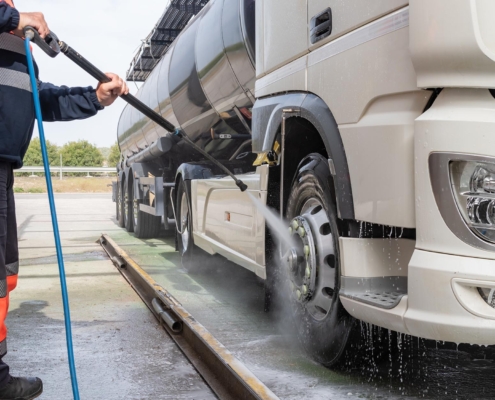
The Complete Preventative Truck Maintenance Checklist
Trucks are pushed thousands of miles daily carrying heavy loads. While they’re designed to take some abuse, nothing can withstand that stress level forever. Get the most mileage out of your trucks with this preventative truck maintenance checklist.
The Importance of Commercial Truck Maintenance
Commercial truck maintenance is the key to efficient and safe transportation. Regular maintenance reduces breakdowns and extends the truck’s lifespan. It also enhances safety on the road, reducing the risk of accidents due to mechanical failures.
Our Commercial Truck Maintenance Program Checklist: 9 Tips for Peace of Mind
Truck repairs are expensive. Preventative truck maintenance makes sure the engine hums, the brakes grab, and the undercarriage stays rust-free. Follow our maintenance plan to keep your trucks on the road long into the future.
Change Oil Regularly
Fresh oil is key to keeping any engine in good shape. Skipping oil changes is punching a quick ticket to mechanical failure. While most manufacturers recommend an oil change every 5,000 to 7,000 miles, oil change frequency depends on a few things, including:
- Type of oil: Does your engine use conventional oil or synthetic? Conventional oil is commonly found in older trucks and needs to be frequently changed.
- Your truck’s oil levels: Driving with low oil levels isn’t advised, as truck engines are put under an enormous amount of stress when operated with low oil.
- Driving conditions: External conditions significantly affect how often you change your engine oil. Environmental factors like extreme temperatures or rough terrain necessitate earlier oil changes.
- Engine type: Every engine has slightly different oil needs. Consult your owner’s manual or online resources to find specific instructions for your truck.
If your engine oil is dark and smoke is coming from your exhaust pipe, you probably need to change your oil. Exhaust pipe smoke is a bad sign regardless of whether you have a traditional or diesel engine. Check your oil filter to see if your engine oil was recently changed. Truck oil maintenance is the most straightforward step of our truck preventative maintenance checklist.
Check the Brakes
Brake failure can lead to accidents, especially with worn-out tank trucks. Commercial truck brakes wear surprisingly fast and need to be regularly replaced.
Braking systems are more than just brake pads—your maintenance provider should install new springs, pins, and bushings throughout your whole system. Outside that hardware, make sure your maintenance provider checks the brake fluid and keeps application pressure at 60 psi or higher.
Failures with braking systems are serious. Have your fleet managers take pre-trip inspections of your braking systems to keep your truck drivers safe. These vehicle inspections could prevent your drivers from getting into accidents.
Keep Your Tires Properly Inflated
Be sure to support your tires with the right amount of pressure. Underinflated tires drag fuel efficiency and damage your wheels over time. Overinflated tires are prone to dangers like blowouts and tread wear.
Use a pressure monitor to make sure your tires get the right amount of pressure. To find out the right amount, consult your owner’s manual or check the rim of your tire for markings.
Take Care of the Truck Body
Body corrosion is one of the leading reasons trucks retire earlier than expected. Rust is inevitable, but it can be slowed down with these best practices:
- Touch up the truck’s paint job and remove rusty paint chips.
- Spray door locks with WD-40 lubricant to prevent unwanted moisture.
- Wash your truck every 10 days. For the best results, perform a tank body wash after every haul, especially if you’re traveling in snowy and wet conditions.
This is a more intensive step of the preventative maintenance checklist, but it is critical to keeping your truck in good condition.
Protect the Engine Belt
The engine belt is the driving force of your truck and crucial for truck maintenance. These durable rubber bands are responsible for stabilizing the mechanical components of your engine, including the alternator and air compressor. Although engine belts are robust, they break down over time. As a best practice, check your belts frequently and replace them every 50,000 miles.
Replace Worn Parts
Stockpile parts you know you’ll need. It’s best to purchase bulk equipment if a manufacturer discontinues a specific product. This may cost more upfront, but the investment will prevent you from making expensive fleet purchases later. Finally, make sure to adopt the longest-term warranty with each purchase.
Monitor the Coolant System
One of the most common mistakes in truck handling is the mismanagement of antifreeze coolant. Always use the right fluid and keep the coolant system clean. You should also invest in a coolant filter to help maintain balanced fluid levels.
Set Up a Truck Maintenance Schedule
Set up a preventative maintenance schedule to keep your truck in great shape. This schedule can be set up on a timeframe that works for you, whether it’s every two weeks or every six months. We recommend maintaining your trucks as regularly as possible.
Schedule Professional Inspections
A professional inspection can determine whether your equipment is safe for use. This inspection is vital to keeping your vehicle compliant with the U.S. Department of Transportation (DOT).
Be consistent with your check-ups and examine all interior and exterior parts and accessories. You should plan an inspection at least once a year, but if you’re seeking the best results, keep your own maintenance log and inspect your equipment regularly.
Interested in professional commercial truck maintenance programs? Check out our process at White Tank & Truck Repair.
Partner With White Tank & Truck Repair for Comprehensive Semi-Truck Maintenance Programs
Keeping up with a maintenance routine can be tough—White Tank & Truck Repair makes it easy. Whether it’s hazmat testing, blower truck services, or tank body installations, our team protects your vehicle while saving you money. Reach out to our experts to start your truck maintenance today.




